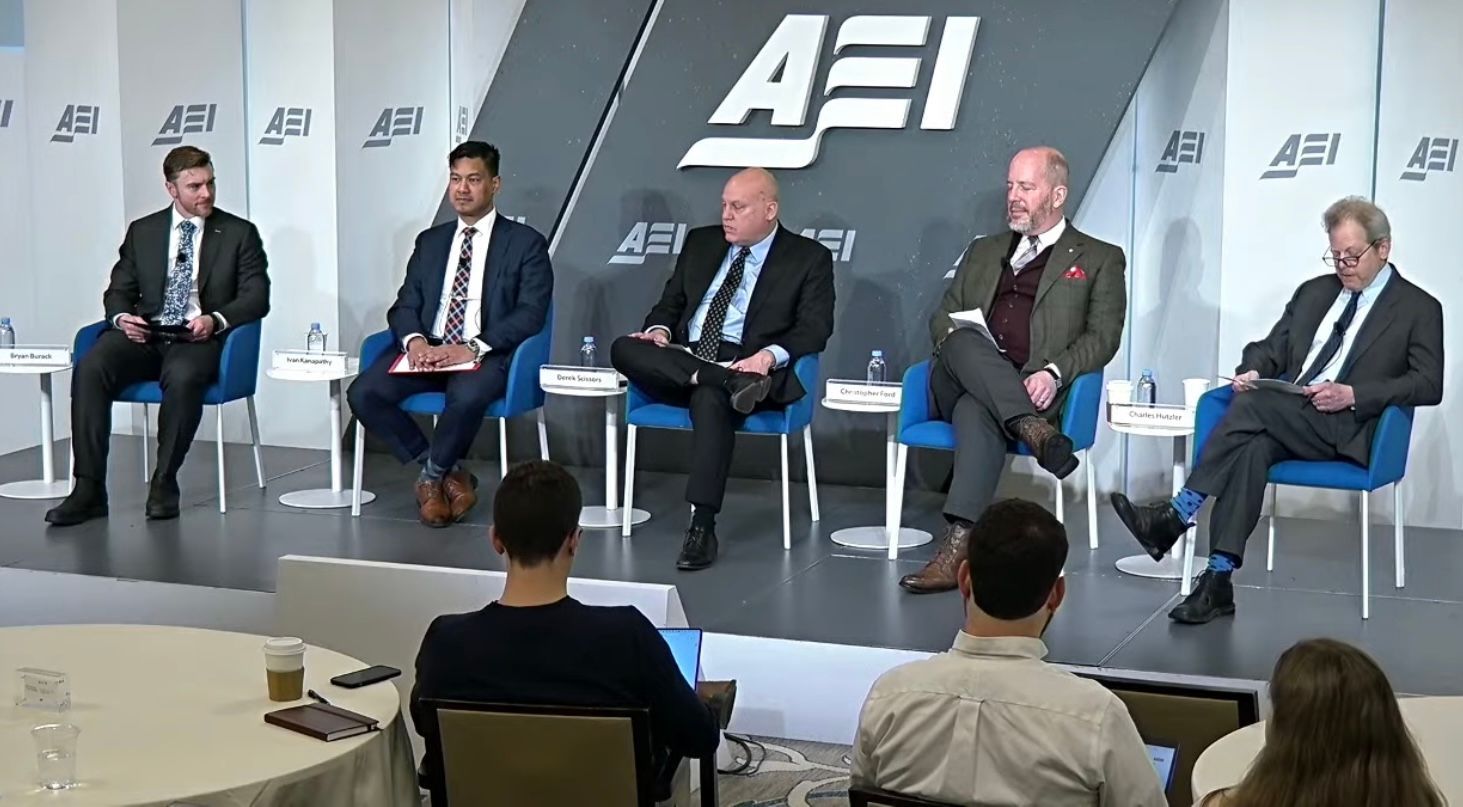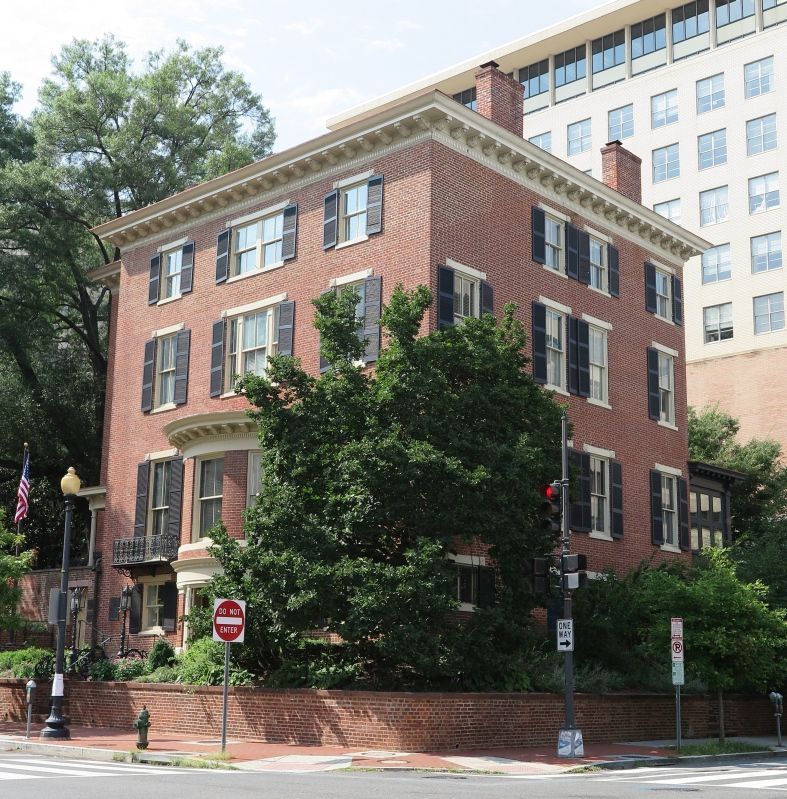The Hon. Christopher A. Ford
New Paradigms Forum -- International Security Policy Since 2009
Law, Iran, and the Bomb
Note: This is a response to George Perkovich’s essay posted earlier on this site as a “Guest Blog.”
George Perkovich and I seem indeed to have been penning our reactions to the October 1 Iranian negotiations at about the same time – no doubt both up too late at night, each of us jet-lagged on our respective overseas business trips. I sent him my thoughts through my e-mail distribution list, and George was kind enough -- in the spirit of friendly debate, as he put it -- to send me his own reactions to the talks. Having published his revised text as the previous entry on this blog, I offer here my further thoughts in response to his analysis.
I. Iranian Legalism
I was intrigued by George’s assessment of Iran’s commitment to depicting itself as following the path of virtue and legality in its relationships with other countries, for I have also noticed the Iranian penchant for legalistic vindication. One need only compare North Korea in this regard. Pyongyang is frankly contemptuous of international norms, and does not bother with any pretense of legality, whereas the regime in Tehran ties itself in rhetorical knots in order to claim , however implausibly, that it is not violating the law. I have also long argued that Iran is very self-consciously engaged in a highly legalistic struggle to shape, and indeed to co-opt, the international community’s interpretation of the peaceful use provisions (Article IV) of the Nuclear Nonproliferation Treaty (NPT) – a struggle in which the United States and its allies, while ostensibly concerned about nonproliferation, have thus far quiet embarrassingly fled the field. The phenomenon of Iran’s recent penchant for legalistic discourse in the nuclear arena is an interesting one, and may perhaps reflect a trait of its “national character.” George is right that “[l]aw provides leverage to those who use it best,” and I join him in being interested in ways in which to leverage Tehran’s attraction to legal argumentation in helping resolve the current nuclear crisis.
Nevertheless, George’s analysis sounded a trifle optimistic to me. To be sure, as we’ve seen again and again since the first revelations about the Natanz and Arak facilities surfaced publicly in 2002, Iran places great stock in claiming not to be a shameless scofflaw. This does not, however, seem to have constrained its behavior in any way more significant than forcing its diplomats to spend time giving voice to convoluted pseudo-legal rationalizations in meetings of the International Atomic Energy Agency (IAEA) Board of Governors, Preparatory Committee meetings of the Nuclear Nonproliferation Treaty (NPT), and letters to the IAEA Director-General.
George is right that “Iran’s legal ‘case’ [about how it did nothing wrong at Qom] was tendentious … even specious.” This case, however, wasn’t notably worse that so many other adventures in shallow, results-driven lawyering we’ve seen emerge from Tehran since this crisis began in 2002. There doesn’t seem to be anything particularly unique about Qom. An evolving dog’s breakfast of legalistic arguments is routinely used to excuse whatever Iran has just been discovered secretly doing, and there doesn’t seem to be much more going on than simple rationalization.
Iran tries to sound virtuous in defending its actions, but these actions violate the law continually. George is wrong that Iran’s strategy has been one of “exploiting the rules without breaking them.” Iran has broken its safeguards and NPT Article III obligations (violated by its work at Kalaye Electric and elsewhere), subsidiary safeguards agreements on the production of facility design information (violated with the Qom facility), and several legally-binding Security Council resolutions (violated anew every day that enrichment and/or reprocessing work continues at Natanz, Arak, Qom, and no doubt elsewhere). Indeed, Iran broke Article II of the NPT in undertaking the weaponization-related work about which Iran continues to stonewall IAEA investigators – and one must conclude that Tehran continues to violate Article II every day with every aspect of its nuclear program if one assumes, as I and most serious observers believe, that Iran’s fundamental purpose here is not , and has never been, just the production of nuclear energy and medical isotopes. (Even Mohammed ElBaradei, after working tirelessly for years to protect Iran from accountability for its many violations, admits that the regime in Tehran is working to acquire the capability that would enable it to produce nuclear weapons.) Iran also uses fatuous legal argumentation on the offense, to blow smoke in the audience’s eyes and pander to the grandstands of non-aligned grievances. (Iran is owed reparations for the existence of Nuclear Suppliers Group export controls? Good grief.)
So far, therefore, Iran’s attachment to the pose of lawfulness on nuclear matters appears to have been little more than an exercise in creatively exculpatory rhetoric. It is interesting that Iran feels it so necessary to use legal arguments in defending itself, but unless we can figure out a way to move Iran out of mere ex post facto rationalization into the realm of actual compliance, this fact will continue to have little relevance to policy-makers struggling to preserve international peace and security.
II. The Lost Opportunity of Qom
I share George’s view that Iran’s decision to build the secret Qom enrichment facility was a mistake, but I depart from his analysis in thinking that it will turn out to be a significant one. With help from international diplomatic timidity, Iran has survived far worse “gotcha” moments in the past. Unfortunately, the U.S. administration and its diplomatic allies have now allowed Iran to weather another potential storm, squandering what was indeed a valuable opportunity finally to exert pressure on Iran.
I indicated in my earlier essay, I don’t see the October 1 result in Geneva as representing “progress.” Quite the contrary. I’ll admit that it isn’t such a bad thing to remove a lot of low enriched uranium (LEU) from Iran’s control for a while. The problem, however, is that we’re committed to giving it back – and in a more highly enriched form that is itself potentially usable in a (very inefficient) nuclear weapon. Perhaps the timing and manner of its enrichment, fabrication, and return will turn out to be rather more constructively protracted than anticipated – one can only hope – but there isn’t much escaping the bottom line. We have promised to give Iran highly enriched uranium (HEU).
We shouldn’t think for a moment that we are setting some kind of precedent that Iran should not retain a stockpile of LEU that could be the basis of a break-out program to enrich to bomb-grade levels. Iran continues to enrich at Natanz, and presumably now will soon also begin enrichment in the retroactively-legitimized centrifuge cascades being installed at Qom. Since the Tehran research reactor only needs one fuel load at the moment – and since the very last thing we should want to do is continue to enrich Iranian LEU to HEU levels – such a “precedent” doesn’t seem very plausible.
Instead, legalistic Iranian diplomats will surely now contend that the October 1 deal sets a precedent that Iran should be considered hereafter to have the right to engage enriching uranium at least to reactor-grade levels (up to about five percent). The negotiations in Geneva thus arguably amounted to not much less than the Obama Administration’s preemptive concession to Iran of pretty much everything it has so far demanded: a “right” to enrichment and the de facto annulment of the several U.N. Security Council resolutions requiring Iran to suspend such work. That does not sound like diplomatic progress, and it certainly represents no victory in the broader legally-tinged “contest for legitimacy” George describes being underway with Iran.
And that’s not even counting the awful precedent set by providing Iran with HEU for “medical isotope” production. It is perhaps worth wondering why, only days after the Qom revelations, we should have been at all interested in helping Iran acquire any sort of nuclear material in the first place – even for “medical” purposes. Nevertheless, if this were our aim, we seem to have chosen rather a bad way to do it. Could our technical experts think of no way to help Iran with any demonstrated needs that didn’t involve giving Tehran bomb-usable enriched uranium and implicitly accepting its ongoing enrichment program? It is indeed possible to convert HEU-fueled research reactors to use LEU targets for medical isotope production, and some isotopes can apparently be produced using only particle accelerators. Just a few months ago, in fact, the National Research Council of the National Academies published a study – paid for by the U.S. Department of Energy pursuant to Congressional requirements to look into the subject – on how to produce medical isotopes without HEU. Was the Obama Administration unaware of this study produced for its own Energy Department?
We have now quite foolishly legitimated Iran’s “need” for 20-percent HEU. (As I observed in my earlier posting on the Geneva talks, such HEU is far more easily and quickly convertible to optimal bomb-grade levels than LEU, and can even be used directly in a very inefficient bomb.) Especially given Iran’s penchant for legalistic argument, we cannot pretend that this precedent will not be noticed – and have consequences. I suspect, therefore, that we have not heard the last of HEU “needs,” whether in Iran or elsewhere. We can expect it now to become a part of the diplomatic community’s ever more perverse and proliferation-facilitating Article IV discourse. Shame on us for handing every future would-be proliferator the ready-made argument that it, too, requires – and has a legal “right” to – theoretically bomb-usable uranium with which to make medical isotopes in a research reactor.
III. “The Long-Needed Shift in Pressure Has Occurred”
George is extraordinarily optimistic in concluding that a solution to the Iranian nuclear mess now may be possible as a result of “changes in the U.S. approach” by President Obama – who, George informs us with vintage campaign rhetoric, “offered change that could be believed in.” Because people apparently no longer “fear” the United States more than they fear Iran, he argues, “the long-needed shift in pressure has occurred,” and “[t]he Iranian government now feels pressured to change its policies.”
Let’s leave aside the fact that thanks to the Obama Administration’s preemptive concessions on HEU and in allowing the post hoc inspection-facilitated legitimization of Qom, Iran probably doesn’t today feel such pressure. More broadly, I would like to take issue with George’s analysis of the last several years of nuclear diplomacy vis-à-vis Iran. He seems to think the main problem with the international response to the first revelations of Iran’s secret nuclear work was the bellicosity of President Bush. By this account, overblown American outrage under the previous administration played to fears of imperial U.S. arrogance, helped Tehran rally support for its cause, and just generally made things worse.
To assess the situation fairly, however, we should avoid simply projecting Iraq-related political neuroses upon an Iranian stage. In reality, the U.S. effort on Iran after August 2002 was everything that critics of U.S. policy wanted us to have done with regard to the anticipated weapons of mass destruction (WMD) threat in Iraq. After secret Iranian work was discovered, the United States tried to work through multilateral diplomacy in the relevant international institutions to deal with the problem. We pressed the IAEA to investigate, demanded that Iran permit the necessary inspections (including giving IAEA inspectors additional authority pursuant to the Additional Protocol), and insisted that the Agency follow its own statute in reporting Iran’s noncompliance to the U.N. Security Council. When the matter belatedly got to the Council, moreover, the United States sought not an authorization for the use of force, but rather the progressive imposition of economic sanctions in order to pressure Iran to comply with the law. This was a notably dovish multilateralism , not unilateralism, and it carefully and rigorously sought to rely upon international mechanisms and institutions – ones in which U.S. demands boiled down to nothing more radical than insisting that these institutions actually do the jobs they were created to do.
Where this approach fell apart, however, was when critics of American policy upset over Iraq derailed this Iranian process through independent deal-making – an exercise in European unilateralism, one might say – that deliberately undercut our scrupulous development of international pressures upon Iran and undermined the authority and effectiveness of the multilateral diplomatic process. Apparently driven by nothing more subtle or sophisticated than Iraq-related pique, this diplomatic adventurism by the so-called EU-3 governments (Britain, France, and Germany) undercut the multilateral process and played into the hands of the Iranian proliferators.
Ironically, we now know that the U.S. effort to solve the Iranian crisis in what we had been so endlessly told (vis-à-vis Iraq) was the “proper” multilateral way was apparently actually starting to show results when the “EU-3” governments pulled the rug out from under its feet. It is usually forgotten – or perhaps just conveniently ignored – that the only time Iran apparently changed its behavior at all during this whole sorry affair was in 2003. At the time, revelations about Iran’s secret nuclear work were pouring out in IAEA reports and it looked for a while like the IAEA Board would report Iran’s safeguards violations to the Security Council, with the distinct possibility that Iran would face serious sanctions. At that time, moreover, the prospect of being caught on the wrong side of an international community indignant about WMD actually seemed worrisome. (This was 2003, after all, when for a time the Iraq war actually seemed to be influencing proliferators such as Libya in the right direction.)
According to U.S. Intelligence Community, at least – in the foolishly-phrased 2007 National Intelligence Estimate (NIE) that even Iranians still enjoy throwing back in the faces of U.S. diplomats – this was the point at which Iran suspended its ongoing nuclear weaponization work. According to U.S. intelligence, this halt “was directed primarily in response to increasing international scrutiny and pressure resulting from exposure of Iran’s previously undeclared nuclear work.” Apparently afraid of what would happen if caught doing something they couldn’t even begin to rationalize away even under the strained readings they were already developing of the NPT’s Article IV, in other words, the Iranians allegedly put the weaponization aspect of their nuclear weapons program on hold. In the face of what seemed likely to be an imminent debacle at the Security Council, they decided to continue ahead, for the moment, only with the enrichment and reprocessing efforts they had undertaken in order to provide fissile material for the cores of their nuclear weapons.
To be sure, that wasn’t a lot of movement, for it’s easy just to suspend work on something, and in any event the most important programmatic bottleneck for weapons development is not weapons engineering but fissile material availability. As U.S. intelligence officials made clear after publication of the NIE , Iran had stopped only what was in some respect “the least significant” portion of its program – a part that could be restarted at leisure once the challenge of producing fissile material was under control. Nevertheless, it was something. At that point, the Bush Administration’s diplomatic effort to work the Iran issue through the IAEA Board and bring things to the Security Council had the Iranians on the run, as it were, and proved that Tehran is responsive to pressure if they are presented with a serious enough prospect of significant pain. (As the 2007 NIE made clear, the fact that Iran’s weaponization work was halted – “at least [for] several years” – “primarily in response to international pressure indicates Tehran’s decisions are guided by a cost-benefit approach.” Pressure, in other words, can work … if we are serious.)
But what happened? The prospect of rough treatment at the hands of the Council quickly evaporated, being quite deliberately undercut by the EU-3 in the concessionary side deal they reached with Tehran in the autumn of 2003. In return for an Iranian “suspension” that the IAEA has documented that Tehran never fully honored, the Europeans drove the U.S.-led multilateral effort at the IAEA into a ditch, making clear to Tehran that their new deal precluded Security Council action. It took years for Iran’s continued deceit and provocations to exhaust the Europeans’ patience, so that by the time the IAEA finally got around to complying with its own statute to report Iran to the Security Council and the first tentative sanctions were applied in 2006, Tehran had come a long way in making its enrichment program into a fait accompli. Natanz had been a hole in the ground in August 2002, but with European complicity, Iran was able to get its first centrifuges spinning by the time any sanctions started to bite.
Iran knew exactly what it was doing, of course, and it played the West for fools. Indeed, far from engaging in the mad saber-rattling George decries, even the Bush Administration eventually joined the EU-3 in this ad hoc end run around multilateralism in the IAEA and the Security Council. In a veritable international conspiracy of the weak-willed, we allowed Iran to drag negotiations out endlessly and offered Tehran repeated concessions, in return for which it continued to work to build its enrichment effort into a well-nigh incontestable “fact on the ground.”
Far from being too bellicose, therefore, we ended up reinforcing the lesson of Western timorousness at almost every step. Iran is behaving precisely as one would expect under the circumstances, and there has been since the autumn of 2003 no real “progress” to which one can today sensibly point.
And here is perhaps the real tragedy of the recent revelations about Qom. After the Qom facility came to light, there was a brief hope that Iran would face meaningful pressure. President Obama should have used his reservoir of international goodwill to take advantage of the opportunity offered by this new outrage, showing real leadership in finally holding Iran accountable for its nuclear defiance – and indeed for its contemptuous spurning of his own famously “outstretched hand.” Instead, just days after winning acceptance of a Security Council resolution that spoke in commendably strong terms about the need to hold states accountable for their actions, our new President showed himself afraid to live up to his own principles, allowing Iran deftly to turn outrage about Qom into international support for in effect forgiving the work there and indeed providing Iran with more highly enriched uranium. It was not a proud day.
So where do we stand now? It most assuredly will not facilitate a constructive resolution of the Iranian nuclear crisis if we cement in place a new international status quo which: (a) allows Iran to retain the ability to manufacture nuclear weapons on relatively short notice using the fissile material production capabilities we seem now implicitly to accept; (b) legitimizes the proliferation of such capabilities essentially everywhere else (for if even today’s belligerent and deceitful Iran can be permitted such technology, who on earth cannot?); (c) endorses the idea that countries “need” theoretically bomb-usable 20-percent-enriched uranium; (d) demonstrates the improvisational erasability of Chapter VII Security Council resolutions; (e) shows IAEA safeguards and the NPT’s Article III to be something with which compliance is optional and noncompliance is essentially costless; and (f) cements in place the principle that secret nuclear work in violation of international obligations is permissible as long as one retroactively declares to the IAEA anything that one is incompetent enough to fail to conceal. Yet all this is precisely what the October 1 “deal” seems to imply.
As I see it, in the international community’s response to Iran there has been for years a persistent failure of vision, which President Obama sadly seems to be continuing. There is a powerful temptation, in struggling with such proliferation challenges, to view crises like this as if they existed in isolation. The Iran crisis, one is tempted to think, is just about Iran; the North Korean crisis is just about North Korea. This is a beguiling view because it makes them seem more easily dealt with, but it is nonsense. We send messages to other would-be proliferators with every diplomatic concession we make in order to keep a recalcitrant treaty violator “at the table,” every delay we condone, and every fabulous rationalization we implicitly accept. Make no mistake: the proliferators and would-be proliferators study the lessons we teach them. Iran has learned much from North Korea, and someone else will surely learn much from Iran. These issues do not exist in isolation, and it does no favor for international peace and security to act as if they do. Unfortunately, the proliferators are better lesson-learners than we are.
Various Western governments – most prominently France, under President Sarkozy, who has to Washington’s shame become more articulate and sensible about Iran than our own leaders, but to some extent also Obama Administration officials – have talked about an end of the year “deadline” for Iran finally to change its course. If our nonproliferation diplomacy is to have any credibility whatsoever in the months and years ahead, we need to mean this. And we need to find the willpower to resist the inevitable Iranian strategy of escalating demands and dribbling pseudo-concessions ( e.g. , inspections at Qom) which will be employed to convince us that such a deadline should repeatedly be extended in the interests of some purported “new” Iranian willingness to talk and the ever-receding hope of a diplomatic solution. The international community’s collective demands of Iran – and Iran’s legal obligations – are clear, and they center around stopping the enrichment and reprocessing program in its tracks and completely and persuasively answering all outstanding IAEA questions ( e.g. , about past weaponization work). We must insist that if Iran has not done all this by January 1, 2010, it will face crippling economic sanctions – no ifs, ands, or buts about it – and the near-inevitability of this result must be made painfully evident.
Building diplomatic support for such long-overdue brinkmanship would certainly not be easy. In fact, after the international community’s sorry track record of not holding Iran accountable over the last seven years, eliciting such support from unserious nonproliferation partners as Russia and China may not even be possible at this point. Nor is there any guarantee that Tehran’s behavior would in fact change even if it were finally faced with meaningful pressure. George thinks that the political legitimacy crisis of the clerical regime – and more specifically, of the radicalized Pasdaran clique around President Mahmoud Ahmadinejad – helps put Iran on the defensive. That may be true diplomatically, to some extent. I wonder, however, whether Iran’s 2009 electoral crisis may make its government more resistant to nuclear compromise, for fear of the “tide is turning” domestic political implications that might be drawn from such a major concession after years of rhetoric about how absolutely essential the nuclear program is to the future of the Islamic Republic. In light of the degree to which past diplomatic deadlines have been ignored without consequence, moreover, Iran’s rulers might be forgiven for assuming that this one is no more serious than the others.
Nevertheless, we have to try, for it is hard to see how we’ll get another chance. On this and other fronts, the political capital provided by President Obama’s honeymoon period is evaporating with astonishing and perhaps unprecedented rapidity, but he retains at least some reservoir of international goodwill and domestic political credibility. International outrage still simmers about Qom – and the obvious Iranian contempt it illustrates not just for international legal obligations but for the P5+1 diplomatic process – and the IAEA apparently stands only a keystroke (and a long overdue discovery of moral courage in the Director General’s office) away of releasing its remarkably incriminating internal report on Iranian weaponization work. Perhaps the United States, Israel, or some other government also possesses additional information about further secret Iranian work. If so, it should consider using it publicly. (It is important to safeguard intelligence sources and methods, but it is also the purpose of intelligence information to provide a basis for policy action, and on occasion one may need to risk a particular source in order to help forestall great ills.)
We are entering the high-stakes end-game of the diplomatic process. If we wish to resolve the Iranian situation in some fashion that avoids the unpalatable alternatives of either accepting Iranian nuclear capabilities (and perhaps overt weaponization), and their follow-on impact both for Iran and in the region, or undertaking or condoning military action, this may be our last chance. The Obama Administration has gotten off to an unpromisingly weak and concessionary start, but the game is not yet quite over. The diplomatic search for a “negotiated solution” has been badly discredited, but may not be dead.
V. A “Rule-Based Solution”?
If this end-of-the-year opportunity ends up being squandered by the Obama Administration as thoroughly as it seems to have managed with the chance provided by international outrage over Qom, we will face ugly choices indeed. I am not necessarily intrinsically opposed to George’s suggestion that we “develop an enforceable agreement … that would classify which nuclear activities are peaceful and which are not.” (In a spirit of charity, let’s leave aside what “enforceable” could possibly mean in this context, given the international community’s track record. Let’s also pass over what verification measures would be necessary in order to preclude weaponization work, and whether one could ever have the “objective[] … confidence” George seeks that “weaponization will not occur.”) If we blow our remaining chances for a real resolution, the time may eventually have to come for some kind of “official” explication of Article IV’s notably vague phrasing about peaceful use.
We should not delude ourselves, however, about what a shallow “solution” George’s anti-weaponization agreement would be, either with Iran or in the broader context of debates under Article IV of the NPT. With regard to Iran, adopting such an approach would amount to expressly conceding the major point upon which Iran has publicly insisted to date: that it has a legal “right” to enrichment and reprocessing technology giving it the easy technical option of developing nuclear weapons at will.
It is difficult to say precisely what the implications would be of Iran’s success in legitimizing its acquisition of the weapons option, but it is hard to imagine them being very pleasant. Empowered in its mischief-making and dreams of regional hegemony by the world’s acknowledgement that it hovers on the brink of having the Bomb – a sort of “virtual” deterrence to go with its newfound status as a “virtual” nuclear weapons state – and with its radicalized and repressive leadership strengthened by having won a huge diplomatic and political victory in defiance of international pressure, Iran would probably not become a better global citizen. Nor would Iran’s neighbors, some of whom in the Arab world have already suddenly become suspiciously interested in pursuing “peaceful nuclear activities” of their own, be likely to take an entirely passive approach to protecting their interests vis-à-vis the newly-empowered Shi’ite radicals in Tehran.
With regard to broader Article IV debates, such an agreement would also seem essentially to generalize just this problematic “right” claimed by Iran, putting us on record as conceding that, in effect, anyone can develop fissile material production capabilities at their discretion – i.e. , that every country on the world may acquire the option of weapons development. A world of ever more states hovering just a bad decision and a brief delay away from nuclear weapons? Not my idea of a victory for U.S. nonproliferation policy. It might be “rule-based,” but it would be a very poor “solution.”
– Christopher Ford



Copyright Dr. Christopher Ford All Rights Reserved






